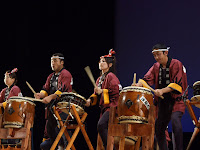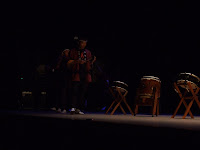


The shift of the seasons is a concept so important in Japan that the appreciation of the change even has its own word, which of course currently I have forgotten. My labmate, Gosuke, tells me that he does not believe people born outside of Japan can properly appreciate the change of seasons, and this particular sensibility is born of more than merely understanding the language (though to me understanding every aspect of the change of seasons, right down to its non-linear dynamics, seems easy compared to his language!)
This change can be appreciated in many ways, the most famous of which are the April and Autumn cherry blossom and maple leaf viewing ceremonies. Some festivals, like setsubun in winter, anticipate the coming change, and in late summer all across Japan a series of such festivals occur, differing in every town in which they occur. The common feature of most such festivals is their dependence upon drumming, whose beat (
hibiki) is perhaps meant to reflect the changing of the times. This drumming is called Taiko, and it just so happens that Mr. Hiroki's charming and pretty girlfriend Miss K is in a Taiko troupe. It being near the end of summer, the Delightful Miss E and myself travelled with my Tottori friends - Mr. Hiroki and the ever amusing Misses K and H - to nearby, atmospheric Kurayoshi to watch her performance. I didn't capture any of the sounds, but here I post a few pictures of the Taiko ceremony we attended. As you can see, the festival took place in a concert hall - in fact, anticipating the change of seasons in Kurayoshi requires the town's largest concert hall, which is packed to the rafters with Tottori Prefecture residents here to feel the pulse of nature.
Sadly this year the change of seasons seems to be coming late, and this abominable heat will not end. But I am waiting patiently for the next turn of the seasons to come. The days are shortening and as the drumming of the locals grows in intensity the throb of insects is fading, so soon that intangible
something will happen, and the whole of Shimane will lurch from a seemingly endless summer to a sudden Autumn of warm, clear days and cool, lazy evenings.


 Kurayoshi has an old town, shirakabe ("white walls") which is quite pretty
Kurayoshi has an old town, shirakabe ("white walls") which is quite pretty  to wander through and happens to contain a quite cool South East Asian hippy store and restaurant, which we visited after the Taiko. Here are a few pictures from that town (these pictures were taken by the Delightful Miss E).
to wander through and happens to contain a quite cool South East Asian hippy store and restaurant, which we visited after the Taiko. Here are a few pictures from that town (these pictures were taken by the Delightful Miss E).





